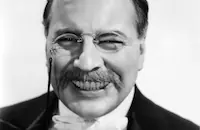Forced Landing
Cast & Crew
Melville Brown
Esther Ralston
Onslow Stevens
Sidney Blackmer
Toby Wing
Eddie Nugent
Film Details
Technical Specs

Synopsis
Al Talcott is released from prison after serving fifteen years for helping to kidnap Jimmy Stafford, who is now an adult and in college. The warden assigns FBI agent Farraday to follow Al, as he was the only member of the gang to know the location of the still-missing ransom money. Farraday suspects that Al's old gang, headed by Tony Bernardi, will also be after Al, and his suspicions prove to be correct. Bernardi follows Al, then calls Al's old girl friend, cabaret singer Ruby Anatole, who informs Bernardi that she does not want anything to do with either of them. Ruby calls her married lover, banker Martin Byrd, but Martin tells her that he is going on a year-long second honeymoon with his wife and that he wishes to end their affair. Ruby decides to go to New York and coincidentally gets on the same plane as Martin and his wife, Al, Bernardi and Jimmy, who is eloping with his fiancée, Amelia Darrell. Also aboard the plane are Farraday, Ruby's traveling companion, Steven Greer, elderly Fanny Townsend, pilot Redfern and stewardess Nancy Rhodes. During the flight, there is a storm and the plane is forced to land on a seldom used airstrip near an abandoned hotel. Everyone disembarks except Al, and when Nancy returns to get him, she discovers that he has been shot. The group goes to the hotel, which is presided over by caretaker Mr. Jolly, and Farraday searches everyone for guns. While looking through Martin's bag, Farraday finds $100,000, which Martin says he is transporting to New York for his bank. None of the guns have been fired, but Farraday nonetheless puts everyone under arrest, then goes to the airstrip's teletype office to send in his report. While Farraday is gone, Bernardi steals back his gun and disappears with Martin's bag. Farraday returns and, after sending Redfern in pursuit of Bernardi, goes with Jimmy to the plane to retrieve Amelia's luggage. Jimmy accidentally locks Farraday in the plane, and when he finally gets out, Farraday finds the teletype operator, Dwight, dead outside the hotel. Farraday realizes that the murderer killed Dwight to prevent him from passing on the last report he received from FBI headquarters, after which he deduces that Martin's gun was the murder weapon. During the ensuing chase, however, Martin kills himself. Farraday finds the last message Dwight received in Martin's pocket, and it states that Martin was not transporting funds for the bank. Ruby then confesses that the money Martin had was the ransom money placed by Al into a safe-deposit box in Martin's bank. Ruby had told Martin about the money, but he was attempting to double-cross her by going to Europe without her. Amelia proclaims that the money belongs to Jimmy, whose family was bankrupted by the kidnapping, and the happy youngsters return to Los Angeles with the others aboard another plane.

Director
Melville Brown
Cast

Esther Ralston

Onslow Stevens

Sidney Blackmer

Toby Wing

Eddie Nugent

Barbara Pepper
Willard Robertson

Bradley Page

Ralf Harolde
Kane Richmond
Arthur Aylesworth
Barbara Bedford
Lionel Belmore
George Cleveland
Sterling Campbell
Dean Benton
Julia Griffith Fanny Townsend
Arnold Gray
Crew

Film Details
Technical Specs

Quotes
Trivia
Notes
A Hollywood Reporter production chart include the following actors in the cast: Harry Brown, Frank LaRue, Johnstone White and Lester Dorr. Their participation in the completed film, however, has not been confirmed. The Variety review noted that writer William Boehnel was the film critic of the New York Telegram. According to the MPAA/PCA Collection at the AMPAS Library, the picture was initially rejected by the PCA because of the suicide of character "Martin Byrd." In a letter to Nat Levine of Republic, PCA Director Joseph I. Breen stated: "The suicide, cheating as it does the carrying out of the law, is too definitely anti-social to be shown to mixed audiences." The PCA had not been sent a script for this film because it was made by M. H. Hoffman, a semi-independent producer linked with Republic, who was not affiliated with the MPPDA. After consultations with a Republic executive, the PCA approved the film for certification with only two minor line deletions because prints had already been sent from Hollywood to the New York office for distribution.












